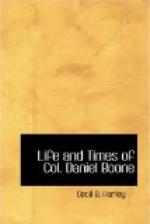The next day, the battle was renewed by small detachments of the enemy, but no general engagement took place. The Indians had suffered severely from the close firing which ensued upon their first attack, and were now maneuvering and awaiting the arrival of reinforcements. No sooner had night closed upon this madly spent day, than the officers assembled in council. They were unanimous in the opinion that the enemy, already as they thought more numerous than their own force, was rapidly increasing in numbers. They therefore determined, without a dissenting voice, to retreat that night, as rapidly as circumstances would permit. This resolution was at once announced to the whole body of volunteers, and the arrangements necessary to carry it into effect were immediately commenced. By nine or ten o’clock every thing was in readiness—the troops properly disposed—and the retreat begun in good order. But unfortunately, says McClung, “they had scarcely moved an hundred paces, when the report of several rifles was heard in the rear, in the direction of the Indian encampment. The troops instantly became very unsteady. At length a solitary voice, in the front rank, called out that their design was discovered, and that the Indians would soon be upon them. Nothing more was necessary. The cavalry were instantly broken; and, as usual, each man endeavored to save himself as he best could. A prodigious uproar ensued, which quickly communicated to the enemy that the white men had routed themselves, and that they had nothing to do but pick up stragglers.” A scene of confusion and carnage now took place, which almost beggars description. All that night and for the whole of the next day, the work of hunting out, running down, and butchering, continued without intermission. But a relation of these sad occurrences does not properly belong to this narrative. The brief account of the expedition which has been given, was deemed necessary as an introduction to the event which now claims attention.




